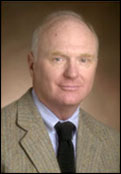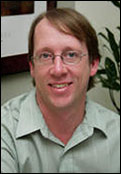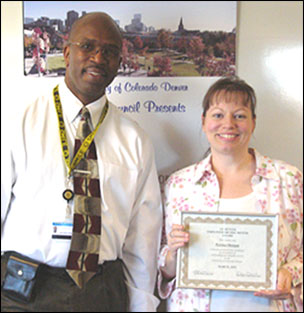People
Published paper looks at screening for bipolar disorders in pregnant women
Research looking at measures used to screen bipolar disorders in the general population and the application of these measures to screen perinatal (during pregnancy and shortly after the time of birth) women recently was published in the Archives of Women's Mental Health."Screening for bipolar disorder during pregnancy and the postpartum period" was published by Cheryl Chessick, M.D., assistant professor of psychiatry and director of women's studies and treatment at the University of Colorado Depression Center, and Sona Dimidjian, Ph.D., assistant professor in the department of psychology at the University of Colorado at Boulder. Chessick also is a consulting psychiatrist in the Perinatal Mood Disorder Clinic at the University of Colorado Hospital.
Bipolar spectrum disorder (BD) among pregnant women and women who have just given birth can lead to a variety of adverse health outcomes for both moms and babies. The disorder can significantly diminish a new mom's capacity to care for and interact with her newborn. Up to 70 percent of women diagnosed with bipolar disorders before having children experience the mood disorder during their reproductive years.
"Despite the magnitude of the problem of bipolar disorder during the perinatal period, effective management of the disorder for women during this life cycle phase is limited," Chessick said. "A critical barrier to progress is a lack of clarity regarding screening measures in this population. Diagnosing women with BD can be challenging, and requires accurate analysis of information provided by the patient."

Four School of Education professors named fellows
 |
Greg Camilli |
Kathy Escamilla |
Kris D. Gutierrez |
Margaret D. LeCompte |
|
Greg Camilli, Kathy Escamilla, Kris D. Gutierrez and Margaret D. LeCompte, professors in the School of Education at the University of Colorado at Boulder, have been named American Educational Research Association Fellows.
The AERA recently named 67 new fellows in recognition of their exceptional scientific or scholarly contributions to education research or significant contribution to the field through the development of research opportunities and settings. The fellows will be inducted on Saturday, May 1, during AERA's 91st annual meeting in Denver.

Career counselor earns STAR honors
Cori Shaff, coordinator for Career Services at the University of Colorado at Boulder, was selected as the Student Affairs Recognition (STAR) honoree for the year. The award honors Student Affairs staff members who bring to life the values of mutual respect, innovation, teaching, learning and responsibility to the community.
Shaff has been a career counselor and the outreach specialist for Career Services since December 2007. She works with other career counselors and the campus community to create career-related programs for CU students. She also meets one-on-one with students and helps with career planning, resume and cover letter writing, job search strategies and other career topics. She earned her undergraduate degree in communications from CU and a master's degree in career counseling from Colorado State University.

Work on tissue bank will aid lung cancer testing
 |
| Miller |
More than a half-dozen groups of researchers at the University of Colorado Cancer Center have promising tests for early diagnosis of lung cancer. In order to validate the developing tests — which include finding elevated levels of lung cancer markers in sputum, blood and exhaled breath — researchers require a broad collection of tissues as well as knowledge of the clinical outcomes of patients who donated them.
A new tissue banking protocol to collect specimens from patients at two Denver lung nodule clinics will help in that mission. It's being worked on by York Miller, M.D. (UCCC lung/head and neck cancer program/School of Medicine pulmonary and critical care medicine/Denver Veterans Administration) and Lung SPORE collaborators including Stephen Malkoski, M.D., and Rob Winn, M.D., (UCCC lung/head and neck cancer program/School of Medicine pulmonary and critical care Medicine).
The Denver VA has had a dedicated lung nodule clinic for years, and the University of Colorado Hospital opened up a similar clinic in May 2009. National Jewish Health also has a lung nodule clinic and might participate in the future.
Both clinics are multidisciplinary, attended by pulmonologists and thoracic surgeons. And both clinics are key referral centers for primary care physicians and pulmonologists who want their patients to be worked up or followed carefully after finding a lung lesion via CT scan.
Miller says there's a need to collect samples from patients at high-risk for developing lung cancer when the nodule is identified, so the nodule clinics are the perfect place for patient recruitment.
The lung nodule trial aims to enroll about 400 patients, collecting samples from patients over the course of a few years as they are biopsied and/or followed up with additional CT scans. The tissue will be collected in the UCCC Lung SPORE tissue bank and made available to researchers via the usual tissue bank mechanism.

Doctor earns grant to study connections between HIV, lung cancer
 |
| Merrick |
Dan Merrick, M.D., (University of Colorado Cancer Center lung/head and neck cancer program/School of Medicine pathology/Denver Veterans Administration) has received a $150,000 Lung Cancer SPORE supplemental grant to study the relationship between HIV infection and lung cancer.
People with HIV/AIDS are living longer thanks to antiretroviral therapies. As survival increases, doctors see increasing numbers of non-AIDS-related malignancies, including head and neck cancer, anal cancer, liver cancer, Hodgkin's lymphoma, and lung cancer among this population. Recent studies have shown:
- HIV/AIDS patients are three to four times more likely to get lung cancer than HIV-negative people (double that if they smoke)
- They are prone to getting lung cancer 10 to 15 years earlier than HIV-negative people
- They seem to progress faster and do worse stage by stage than HIV-negative people
- Post-diagnosis survival for HIV/AIDS patients is half that of HIV-negative people—5 months versus 10 months
Merrick's grant is a collaboration with physicians in the infectious disease or HIV clinics at University of Colorado Hospital, Denver VA and the Medical University of South Carolina.
The project's first aim is to identify HIV positive patients with a history of lung cancer to help build a national repository of lung cancer tissue with associated patient data. The second aim is to understand the frequency and severity of premalignant lung lesions by recruiting about two dozen HIV-positive patients who are smokers to bronchoscopy.
Merrick, whose research focuses on both premalignant and malignant bronchial lesions, says the information will be helpful in developing adequate screening programs and identifying good chemoprevention strategies to decrease the amount of life lost to lung cancer in the HIV-positive population.

Dropping names ...
 |
| Morgan, right, with Richard Benson, senior human resources consultant. |
The University of Colorado Denver Staff Council Employee of the Month for March 2010 is Petrina Morgan. Besides excelling in her job as program assistant in the department of mechanical engineering and College of Engineering human resources manager, Morgan took on college finance responsibilities after the recent departure of a college finance staff member. Morgan quickly and efficiently learned finance policies and procedures. ... Phil Strain, professor in the School of Education and Human Development at the University of Colorado Denver, has been asked by the Institute for Education Sciences to lead a group of senior scholars in developing a comprehensive review of evidence-based practices for children with autism. The final products will become part of the What Works Clearinghouse series on educational practices that meet the highest levels of scientific evidence. ... The Colorado Chapter of the American College of Physicians recently honored two University of Colorado School of Medicine faculty. Robert Anderson, chair of the department of medicine, received the Laureate Award — the chapter's highest honor for an internist. Christine Gilroy, associate professor of medicine and medical director of the Urban Peak Center for troubled and homeless adolescents, received the Volunteerism Award for her contributions to the community. ... Michael Jenson, associate professor of architecture at the University of Colorado Denver, has been chosen a fellow for the 2010-2011 Center for Humanities and the Arts Seminar at the University of Colorado at Boulder. The theme for the interdisciplinary seminar is "China." As a fellow, Jenson will attend monthly work-in-progress sessions and lecture series events, and present a piece of his work at a colloquium in Spring 2011.
 |
| Krizek |
... Kevin J. Krizek, associate professor of planning and design at UC Denver, director of the Active Communities/Transportation (ACT) Research Group and director of the Ph.D. program in design and planning, is the lead author of "Is There a Role for Evidence-Based Practice in Urban Planning and Policy?" published by Planning Theory and Practice, Vol. 10, No. 4 (December), 459-478. The article seeks to respond to the question: Can the craft of planning take advantage of a growing body of planning-relevant research?
Want to suggest a colleague — or yourself — for People? Please e-mail information to Jay.Dedrick@cu.edu

|